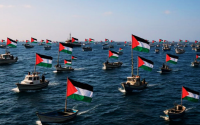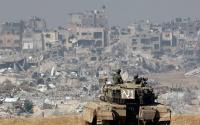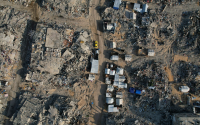Simon TisdallJuly 31, 2002
Is Iran next after Iraq? Iranians have good reason to wonder as the Bush administration refines bellicose plans for "regime change" in Baghdad. If George Bush can seriously contemplate an all-out invasion of the next-door neighbours, then Tehran's theocrats must ask what Washington has in store for them. After all, they meet Bush's fatuous "rogue state" criteria with ease.
Since becoming president, Bush has labelled Iran a part of the "axis of evil" and accused it of sponsoring terrorism via Hizbullah in Lebanon and of shipping arms to the Palestinians. Iran is said by Washington to harbour al-Qaida remnants fleeing Afghanistan.
The Pentagon and CIA assert that Iran is "actively" acquiring weapons of mass destruction. It has, for example, "manufactured and stockpiled chemical weapons" (just like the US, in fact). It is estimated that Iran will attain nuclear weapons and long-range missile capability within seven years. This is said to represent a direct threat to (nuclear-capable) Israel and, indirectly, to the US and its Nato allies.
All this is quite sufficient to warrant pre-emptive military or other action under the new Bush doctrine rules. In some respects, Iran's alleged transgressions exceed those of Iraq. And after a brief period last autumn when the US sought and obtained Iran's help in attacking the Taliban, Washington has presented an increasingly hostile face to Tehran.
Bush has eschewed diplomatic contacts, renewed bilateral sanctions, penalised foreign firms doing business with Iran, and opposed British and EU efforts to build bridges through "critical engagement". This ostracism is total. The US talks to that other axis member, North Korea. But Iran is entirely frozen out.
The US is also pressing Russia to end its joint nuclear energy development project at Bushehr. This civilian plant is subject to international inspection and Russia has undertaken to repatriate spent fuel. But the US suspects nuclear weapons-related skulduggery, while Israel has indicated it will blow it up rather than allow it to come on line.
Looked at from Tehran, the US military build-up in Qatar, Bahrain and Kuwait, its bases in Saudi Arabia, Turkey and Afghanistan, and its strategic lunge into former Soviet central Asia appear just as worrying as when viewed from Baghdad.
Then, just when it seemed relations could not get any worse, they promptly did.
In a personal statement on July 12, Bush denounced the Iranian government's "uncompromising, destructive policies" at home and seemed to urge the Iranian people to rise up and over throw their leaders, democratically elected or otherwise.
Explaining this provocative intervention, officials said the US no longer believed President Mohammad Khatami, returned to office in a landslide victory last year, could or would fulfil his promises of gradual reform.
The clear implication of this extraordinary bit of meddling was that Iran, like Iraq, must change - or face the (US-dictated) consequences. Washington wants a second, secular Iranian revolution - and it wants it now.
Now, it is undoubtedly true that the politicised mullahs who control many aspects of Iran's society and external policy form a reflexively illiberal, occasionally brutal clique. In only the past few days, Mohsen Mirdamadi, publisher of Iran's leading pro-reform newspaper, Norouz, has been sentenced to jail for spreading lies and propaganda against the Islamic republic. Norouz, like many such publications, has been banned. On Sunday, 33 reformers were jailed for up to 10 years for undermining the "holy system".
Such repression is shamefully familiar. But it does not pass unchallenged. Earlier this month a clarion call for peaceful, social change issued forth from within clerical ranks. Ayatollah Jalaluddin Taheri mocked the corrupt elite who consider themselves "our betters" and condemned the "fascist thugs" who do their bidding on the streets.
Even amid the backlash following Bush's words, with reformers being denounced as "stooges" of the "Great Satan", people such as Mohammad Reza Khatami, leader of the majority party in the Majlis (parliament) and the president's brother, continued to insist that better relations with the west were Iran's best way forward.
He is right. Iran is a young country, with great resources, slowly finding its feet after decades of neocolonialism and turmoil. It upholds an Islamic tradition that deserves respect. It has made some bad choices and will probably make some more. But social and civil reform will come, as surely as old men grow weak and die.
By demonising, destabilising and threatening Iran, like Iraq, with violence, the US foolishly obstructs this evolution, boosts the hardliners and risks provoking a widening Middle East conflagration. At present, Iran is not a threat. Mr Bush is.






